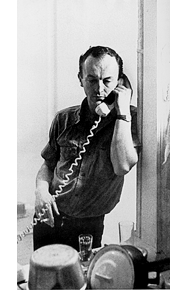I picked up The Year of Magical Thinking last year sometime. It was a bit beaten up from the shelves of Goodwill, but I knew I wanted it. Seeing it there reminded me immediately of how overwhelmed and stunned I had been driving to work one morning in 2005 when a conversation with Didion came on NPR. I drove that morning mouth agape, shoulders heavy with the idea of facing the belongings of loved ones after they've died.
Maybe that's how the book made it to Goodwill, after all.
I was reluctant to read it because I knew it would be heavy. My job is a constant state of stress, the holidays had finally ended, I had just survived PhD applications and our finances were topsy-turvy. On top of that, I got sick for 3 weeks. The last thing I needed to worry about was someone else's grieving process. I read the inside cover to my husband and he looked at me with wide-eyes and shook his head in a silent communiqué that it was, indeed, too intense for my present state.
Yet somehow I picked it up one night before bed and started in. I have been swimming around in theories about autobiography and memoir and it seemed like as good a time as any.
I had never read Didion before, but know that she is well respected by many. She has had a long career as a writer and I felt that she, of all people, would be able to carefully reconstruct a difficult time and make it meaningful to others. And it was...I felt bad for her throughout, but not as bad as I wanted. She didn't want a pity party, and perhaps that is why the collection of thoughts and feelings from her husband's death and daughter's illness is so overly calculated. Each moment of insightfulness and charm was just overruled by a cold, calculation that in a lot of ways appeared to lack sincerity.
Now, she talks about this compartmentalizing nature of the brain to deal with grief. With a loss of time and meaning. How logic kicks in and tricks reality because it has to. Perhaps writing this piece was what she needed to do to reconnect her own constructed reality with the more temporal and corporeal reality.
I wanted it to be as good as the interview. I suppose she could be more candid in speech, even though she is a writer. I heard once that her technique is to rewrite everything she has written in a piece over again at the start of each day before adding to it or editing it. It would explain a lot about this piece and the spinning of time and yarn that never has much trajectory but reviews and revisits in different shades of meaning.
Kudos? Sure. National Book Award? Not on my watch.



No comments:
Post a Comment